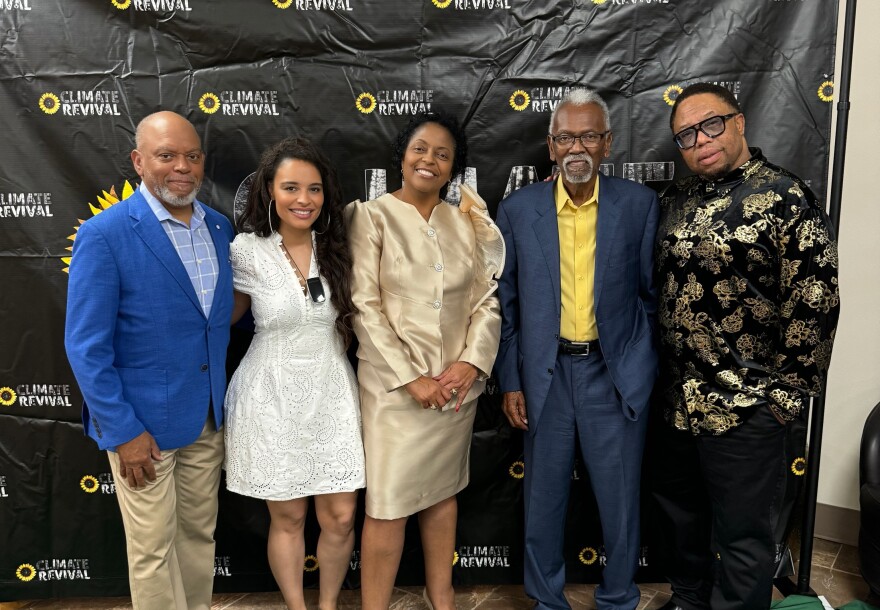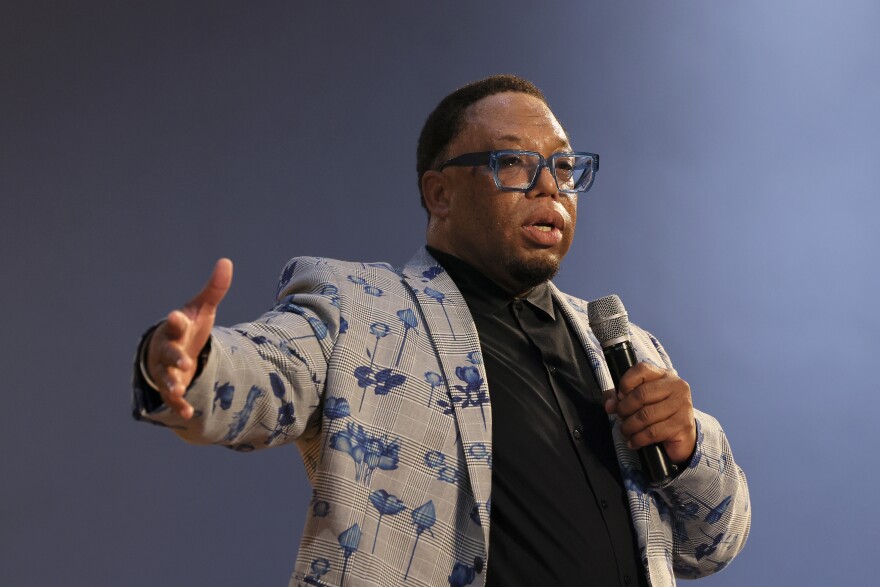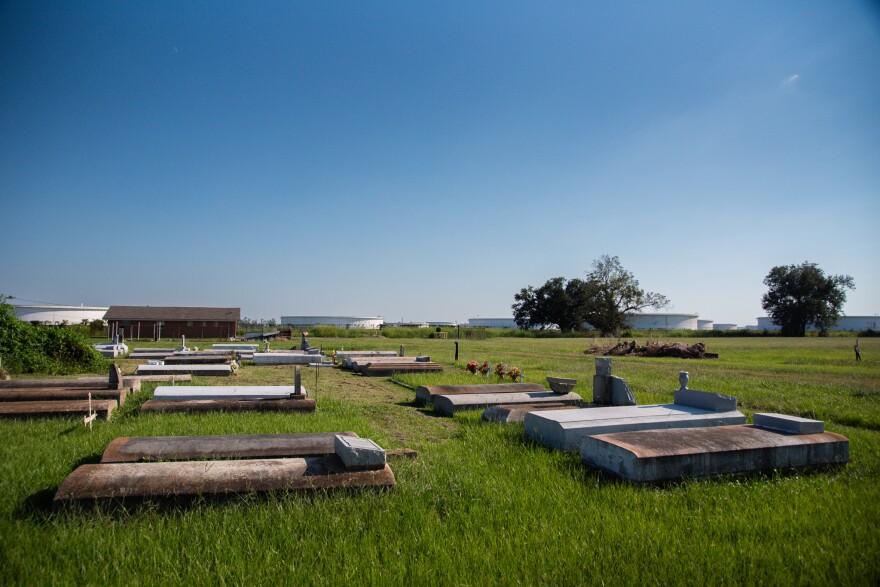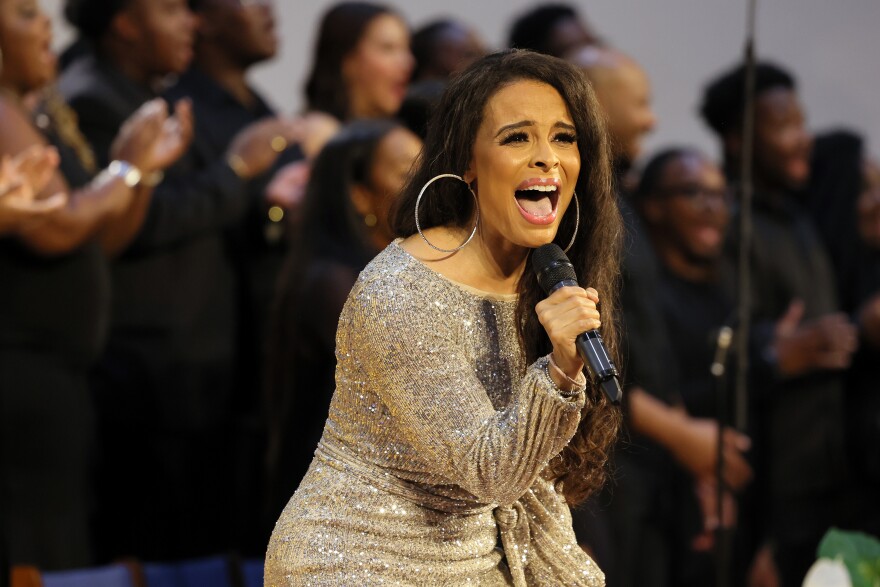Grammy-nominated R&B singer Antonique Smith grew up north of a chemical plant in New Jersey. She still remembers the smell that lingered as she drove by on the state’s Turnpike.
“It's very famous smell. People used to call it the smell of money,” Smith said. “And honestly, we know it's the smell of cancer. It's the smell of asthma.”
Smith became an environmental “artivist” — an activist who uses their art for advocacy — 10 years ago when she covered Marvin Gaye’s climate anthem, “Mercy Mercy Me,” for the first-ever hip-hop album dedicated to climate change. The album, H.O.M.E., was developed by Hip Hop Caucus, a national nonprofit that merges environmental issues with hip-hop culture.

Now, Smith has launched her own nonprofit called Climate Revival that has a similar mission: motivating Black and faith communities to combat environmental injustice with their vote. She kicked off her first gospel concert tour in one of the country’s largest hotspots for toxic air last week: Louisiana’s chemical corridor.
Research shows the high concentration of chemical plants along the 85-mile stretch of the Mississippi River from Baton Rouge through New Orleans increases the risk for health issues for the residents living near the plants. The region has been nicknamed Cancer Alley since the 1980s. In 2021, a peer-reviewed study estimated that toxic air pollution leads to 85 cancer cases in Louisiana each year, linking higher pollution to higher cancer rates.
Ahead of her concert, Smith visited St. James Parish, in the heart of the industrialized region, for the first time. Sharon Lavigne, a local environmental activist and St. James resident, gave her a tour of the community. Lavigne was named to Time magazine’s list of 100 “most influential people” this year.
During the tour, Lavigne pointed to house after house, naming dozens of people with various types of cancer. The list included her own brother.
“He has prostate cancer,” Lavigne said, then continued as more houses passed. “The man over here has cancer. Janice, back there, has cancer. The lady in this house right down the street, she developed cancer.”
Along the 10-mile drive, some neighborhoods were sandwiched between industrial plants. Smith said she was shocked to see plants sit within several hundred feet of houses.
“This area, I mean, we passed by probably 10 plants just driving up the street and it makes my little area in New Jersey look like a little playground, like they ain't doing nothing compared to this,” Smith said. “The fact that people live right here, there's churches right here, there's schools. I mean, it's just unbelievable.”
Smith said she hopes her platform and gospel tour will bring attention to communities like St. James, where Black people face the brunt of pollution.
Rev. Lennox Yearwood leads the Hip Hop Caucus and co-founded Climate Revival with Smith. The New Orleans native has advocated for climate and environmental justice since Hurricane Katrina struck the region in 2005.
He said there has been a “schism” between the environmental movement and the faith community — and he hopes Smith can bridge the gap.
“If she's able to bridge that gap, then I do think that more people will understand the issue. She'll broaden the movement,” Yearwood said.

He thinks there’s a natural fit between faith and taking action to protect communities that are the most vulnerable to climate change.
“Faith should be reminding you that people shouldn't be either living like that or dying like that,” he said.
Working through the church is also another way to encourage Black voters to prioritize a candidate’s stance on climate policy ahead of the November election. Nationally, less than 40% of people say global warming is an important issue for their vote, regardless of race.
Smith and Yearwood both cited a recent Yale survey that found the majority of Black people don’t know about climate justice. But after learning more, they were the group most likely to support reducing the unequal harms of climate change.
Several studies have found that Black people are disproportionately harmed by environmental pollution and climate change. For example, in July, a study by Stanford Medicine found that Black people are “significantly more likely” to die from air pollution compared to other racial and ethnic groups due to higher exposure and systemic disadvantages.
Smith said she wants to connect the dots and help Black voters understand that the extreme weather they see on the news is related to climate change and fossil fuel pollution.
“If you're seeing the storms, you're like, ‘Oh, Mother Nature is tripping,’ and that's what it feels like. It's nothing we could do about it. It's out of our hands,” she said. “And that is not the case. There is an actual cause. Mother Nature is responding, she's not tripping. She's responding to what is being done.”
Back on the tour of St. James, Lavigne took Smith to a small cemetery sitting between two chemical plants. Massive storage tanks stood on either side. Lavigne said she knew some of the people buried here, including one who died of cancer.
Looking at the graves, she said she feels this election is important — she’s afraid of what will happen if the next president doesn’t take climate change seriously.
“I’m telling you, they're going to bring more industry in. They're going to push it to let them pollute us,” Lavigne said. “So that's why we have to get out there and do our part.”

In the presidential race, Vice President Kamala Harris and former President Donald Trump have starkly different stances on climate policy.
In her previous run for presidency, Harris released a $10 trillion plan to transition to renewable energy and hold polluters accountable for contributing to human-caused global warming. Harris has called the changing climate “an existential threat.”
As president, Trump pulled the U.S. out of the Paris Climate Agreement. During this campaign, he is promoting a plan for U.S. “energy dominance” that involves boosting oil and natural gas production, rolling back environmental regulations and slowing down renewable energy development. Burning fossil fuels like oil and natural gas are the largest contributor to global warming.
Smith’s organization is nonpartisan and isn’t endorsing any candidates. That’s why Smith is focused on raising awareness about the changing climate and empowering the church community to mobilize around the issue.
“To me, voting on climate is voting for yourself. It is voting for your own health, it is voting for your own existence,” she said.
Smith’s concert tour will stop in seven cities after St. James, ending in her home state of New Jersey just two days before the election.





